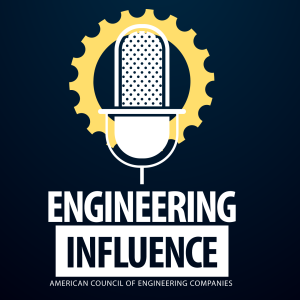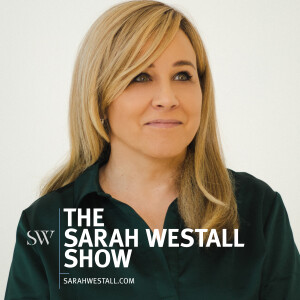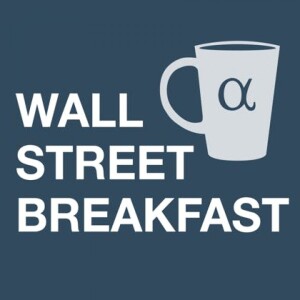
Engineering Influence from ACEC
News:Business News
On today's episode of Engineering Influence, we welcome back Erin McLaughlin to provide a overview of her latest Private Industry Brief, which is available on www.acec.org.
Transcript:
Host: Welcome to another edition of engineering influence, a podcast by the American Council of Engineering Companies. And once again, we are very pleased to welcome Erin McLaughlin, our own Erin McLaughlin, who handles all of our private market research and produces the Private Industry Brief, which is a very popular document available online at www.acec.org that covers the gamut of private market activity. And it's a regular document that looks at different sectors of the economy and in this issue available now online, we're looking at the Q3 - quarter three - 2019 review and Erin has pointed out a couple of highlights from the report and welcome back. And what are those highlights?
Erin: Thank you. Well even though in Q2 and earlier this year, lots of folks were talking about when a recession would hit. Overall, we've seen that a recession does not seem to be immediately coming and we continue to have the longest economic expansion on record. So as of November, that was 125 months. We still have the record low unemployment rate, which averaged 3.6% in Q3. This obviously for our member firms has resulted in finding talent being a significant challenge and any fears of sort of the global economic market, which is slower than the U.S. Market influencing us has sort of been mitigated by the Fed Reserve, which has lowered interest rates three times in 2019 and all within the last four months.
Host: Yeah. And talking to some people, they understand that Europe's kind of bottomed out with their kind of economic decline and it seems like they're in the process of stabilizing so that that's had an impact as well. But the labor crunch as always, I mean it's great to have close to full employment but doesn't really make it easy to get talent and it's a very competitive market.
Speaker 3: It is. But on the upside we're continuing to see member firm revenues grow. So the U.S. Census Bureau actually tracks A/E firm revenues and puts out a quarterly report. They released their first estimate for Q3 on November 19th and it showed at $91.73 billion in firm revenues for the third quarter. So that's the last two quarters. It's gone up a little bit after sort of declining in the fourth quarter of 2018 and the first quarter of 2019. So sort of similar to the construction spending the ups and the downs are very minute. So I would say it's pretty flat, flat but strong. So, and then sort of some of the other A/E macro industry indicators have also been pretty flat. So the ABC backlog indicator is still, when you average it out, hovering about 8.8 months of construction backlog and sort of the new housing units starting and some of the other economic indicators remain solid.
Host: So one of the things that we talked about before going on was kind of the I guess the dismal science of economics, the upside risk. Now everything's going bad, but this one great thing is happening. So what's the upside risk for our industry?
Erin: The upside risk? So we belong to the national association for business economics and they do a great, they do great surveys of sort of macro economic forecasters that cover all different industries folks that work for trade associations, wall street, federal reserve banks, et cetera, and sort of the A/E/C industry. So they are not specific, they're not specifically looking at that design or the construction market. However, in their most recent survey when these macro economic economic forecasters were asked, what is the greatest upside risk to the economy, infrastructure spending came in third and that came in after strong wage growth and reduced a trade protectionism. So the fact that, you know, as our economy sort of flattens out and may or may not decline in the next, you know, 12 to 24 months, the fact that there could be greater infrastructure spending on the horizon, you know, might help it for our industry, any sort of slow down.
Erin: And I think just my insight is that might be especially true given how low interest rates are. So within the economist community, there's a conversation about how, you know, during a recession or to mitigate a recession, you would lower interest rates, but they're so low already. There's only so much you can do within that policy toolbox. So sort of counter to lowering interest rates is stimulus. So we're hoping here at ACC to keep, you know, working in, hammering that issue for our people that are in the advocacy groups so that when we're presented the opportunity, we can help policymakers understand that in that tool box, it's not just lowering interest rates, but also spending on infrastructure. So
Host: Yeah, it's the best time to start investing in infrastructure. Federal, of course, this is, you know, FAST Act, you know, we've got to look at moving on that and the Congress and then the States are doing their own thing with investing and that's good. But national leadership is something that we are continuing to advocate strongly for. So the point is well taken. You can't lower interest rates that much further and it's the prime time to start building things.
Erin: Exactly. One of the, one of the sectors that I was most surprised at is both when you look back at 12 months from Q3 of this year through Q3 of 2019, and what money is being spent on what construction sectors, the two leading sectors are water supply, which is more than 20....has grown more than 20% and sewage and waste disposal, which is an 18% growth. So those are the top two. And what the, you know, for most of our member firms, water supply and sewage and waste disposal are the water wastewater folks. You know, the people that serve that market. And I think that really that spending is going to continue. We've seen in certain parts of the country and Michigan and New Jersey and elsewhere that the decline of the water systems has given policymakers and those that fund those kinds of projects real, a real sense of urgency that I think we're now starting to see the result of.
Host: Yeah, they have that incentive now with Camden and Flint, they're really take a close look at the last time that they really made improvements to the road infrastructure and, and and that's good - it's a societal good because it means that they're paying attention to it, which reflects that growth in that market. So let's kind of round out this brief update with the index of consumer sentiment. Where does that stand?
Erin: Well, and then that is not an index that I usually highlight. But it is one of the driving the driving growth of our continued economy is that people are still spending money and feeling good about spending money as consumers. That is certainly driving the Amazon spending the last mile, the intermodal and logistics, that sort of freight transportation related market that a lot of our members play in. But it's, even though the index of consumer sentiment is really strong University of Michigan is the one I highlighted in the brief as a 2018. It was up at 98.4. This is after a low in 2008, 11 years ago of 63.7. So it's very, very strong. But that strength has not translated into sort of the real estate market being larger when it comes to the retail square square footage. So it's just a fun fact that even though a consumer sentiment in spending is strong in the retail market, on the private side spaces are still shrinking and becoming other things, which is really interesting.
Host: Yeah. People were buying more things, but they're buying it online. So yeah, you don't need as much retail square footage, brick and mortar construction as you used to. So that's a really interesting point. So what's next for the brief? What do we have coming up next issue?
Erin: The next issue is the intermodal and logistics issue, which we'll talk about sort of freight, transportation and land use and ports and congestion, and all of that good stuff and the sort of market for our member firms in that. And then our next quarterly report will be a Q4 review for 2019 and an outlook for 2020. And so that will be out in sort of mid winter and we can reflect back on 2019 but also look ahead to 2020
Host: 2020 and the the new year and all that it will bring. Erin, thank you again for coming back on the show again. The the private market briefs are a great source of information, very, very easy to read and digest to pick apart. A lot of graphics, a lot of visuals. If you're an executive who just wants a quick snapshot of the economy or a business sector and you don't feel like going through a lot of reports, this is a great resource for you. Again, just go on to acec.org and you'll find them both this edition and past additions and you can just sign up to subscribe so you don't have to do anything. They'll just get delivered right to you. So thank you again for coming back on and we'll see you next time.
Erin: Thank you.
More Episodes
Stantec’s Dr. Rick Huijbregts on the Present and Future of Smart Cities
 2022-03-10
2022-03-10
 427
427
ROG + Partners’ Steve Gido on M&A on the Deal Craze in Today’s Design Services Industry
 2022-03-04
2022-03-04
 389
389
A Preview of ACEC’s Re-imagined Business Development & Marketing Forum
 2022-02-25
2022-02-25
 471
471
February Economic Update
 2022-02-24
2022-02-24
 316
316
E-Week 2022: A Conversation with Simil Raghavan from EngineerGirl.org
 2022-02-23
2022-02-23
 327
327
A Closer Look at the New Engineering Business Sentiment Study
 2022-02-23
2022-02-23
 347
347
ESG and the Engineering Industry with Jensen Hughes’ CEO Raj Arora
 2022-02-17
2022-02-17
 534
534
ACEC and FIDIC To Explore Integrity and Fraud Prevention in International Projects
 2022-02-09
2022-02-09
 436
436
Get to Know Your ExCom: Incoming Vice Chair Janice Marsters
 2022-02-08
2022-02-08
 363
363
Essentials of Risk Management for Consulting Engineers course
 2022-02-07
2022-02-07
 454
454
Get to Know Your ExCom: Incoming Vice Chair Dan Larson
 2022-02-04
2022-02-04
 326
326
Spotlight on Diversity, Equity, Inclusion, and Belonging with Gannett Fleming’s Masai Lawson
 2022-02-04
2022-02-04
 416
416
Get to Know Your ExCom: Incoming NAECE President Joe Fiordaliso
 2022-02-03
2022-02-03
 325
325
Get to Know Your ExCom: Jay Wolverton, Chair-elect 2022-2023
 2022-02-01
2022-02-01
 354
354
Get to Know Your ExCom: Vice Chair Ralph Guida
 2022-01-31
2022-01-31
 327
327
Get to Know Your ExCom: W. Art Barrett, II, Chair-elect 2021-2022
 2022-01-28
2022-01-28
 370
370
Asserting Your Value as an Engineer with Derek Clyburn
 2022-01-28
2022-01-28
 383
383
The January 2022 Economic Update
 2022-01-26
2022-01-26
 345
345
An Interview with Rep. John Katko (R-NY)
 2022-01-14
2022-01-14
 508
508
December 2021 Economic Update
 2021-12-23
2021-12-23
 477
477
Create your
podcast in
minutes
- Full-featured podcast site
- Unlimited storage and bandwidth
- Comprehensive podcast stats
- Distribute to Apple Podcasts, Spotify, and more
- Make money with your podcast
It is Free
You may also like

Startitup podcasty


Sarah Westall - Business Game Changers


Børsen Morgenbriefing


Wall Street Breakfast


WSJ’s Take On the Week


- Privacy Policy
- Cookie Policy
- Terms of Use
- Consent Preferences
- Copyright © 2015-2024 Podbean.com



 iOS
iOS Android
Android